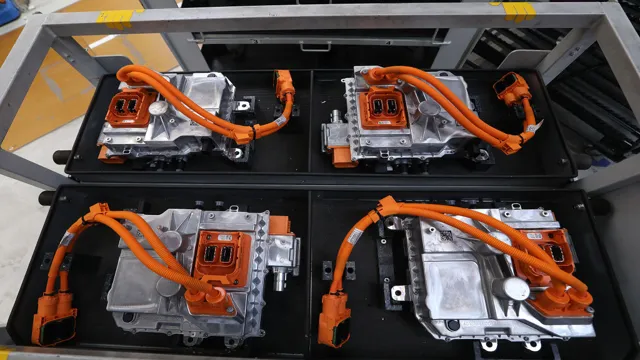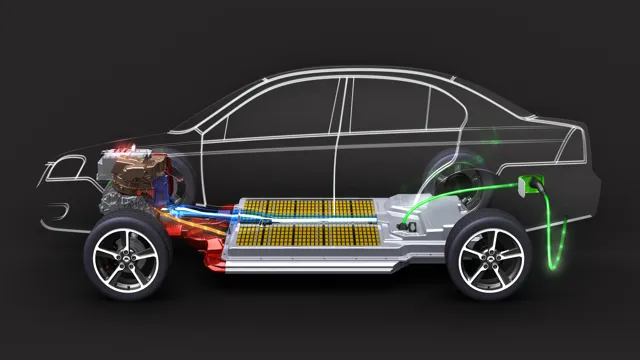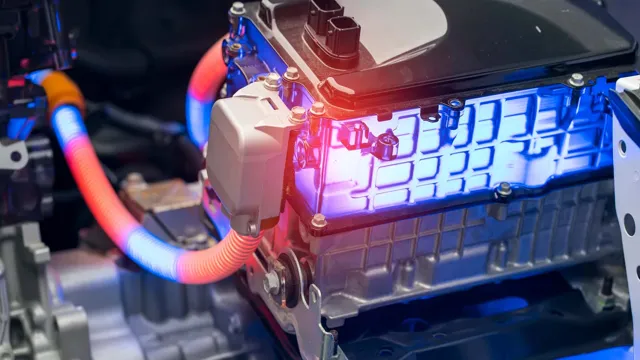Revolutionizing Electric Cars: The Importance of Proper Battery Sizing
Electric vehicles are taking the world by storm, and for a good reason — they offer a cleaner, greener, and more sustainable mode of transportation. However, one of the biggest challenges with these cars is battery sizing. As a potential buyer of an electric vehicle, you might be wondering how to ensure that you get the right battery size for your needs.
In this blog, we’ll take a closer look at electric car battery sizing, dissecting the key factors that determine the size of the battery needed for your electric vehicle. Join us as we explore this fascinating topic and empower you with the knowledge you need to make an informed decision when shopping for an electric vehicle.
Why Battery Size Matters
When considering buying an electric car, one of the most important factors to think about is the size of the battery. A larger battery means a greater driving range, which is one of the main concerns of many drivers. However, a bigger battery also means a higher price tag, so it’s important to strike the right balance between cost and functionality.
It’s also worth noting that charging time increases with the battery size, so if you don’t regularly take long journeys, a smaller battery may be more practical. In addition, a larger battery can be heavier, which can impact the vehicle’s performance. Ultimately, it’s up to the individual buyer to decide what size battery is best suited to their needs, but it’s always worth taking the time to research and compare options before making a purchase.
Range and Performance Depend on Battery Capacity
Electric cars run on battery power, and hence the range and performance of these vehicles largely depend on the size of their batteries. If the battery capacity is low, the car’s range will be limited, and the performance will be compromised. However, a larger battery capacity will result in a longer range, improved acceleration, and a better overall driving experience.
Battery size matters as it is the power source that drives the car, and a bigger battery means more stored energy that can be put to good use. Larger batteries also enable faster charging times, saving both time and money. Therefore, when considering purchasing an electric car, it is essential to take into account the battery size and its impact on the vehicle’s range and performance for a better driving experience.
Smaller Batteries May be More Affordable, but Less Practical
Battery size can greatly impact the practicality and affordability of devices that use them. While smaller batteries may be less expensive, they often offer less longevity and limited capabilities compared to larger ones. For example, a smaller battery may be more affordable for a smartphone, but it will not last as long and may need to be replaced more frequently.
Similarly, smaller batteries in electric cars may limit the amount of power they can store and reduce their range. On the other hand, larger batteries offer more power and longer lifespans, but they can be more expensive. Overall, it is important to consider battery size when evaluating the practicality and affordability of a device.
How Battery Size is Determined
When it comes to electric car battery sizing, there are a few factors that determine the size needed. First, the size of the vehicle and its weight play a major role in determining the battery size. The larger and heavier the vehicle, the larger the battery needed to power it.
Second, the range of the vehicle also factors in. If the car needs to travel longer distances, a larger battery will be necessary. Lastly, the intended use of the car is important.
If it will primarily be used for short trips around town, a smaller battery may be sufficient. However, if it will be used for long commutes or road trips, a larger battery will be necessary to ensure it can make it to the intended destination. Overall, electric car battery sizing is a delicate balance between finding the right size to meet your needs without sacrificing range or performance.
Vehicle Weight and Motor Efficiency
When determining the size of a battery for electric vehicles, one must consider vehicle weight and motor efficiency. The battery size needs to be large enough to support the weight of the vehicle and efficiently power the motor. Additionally, a larger battery may be necessary for longer driving ranges.
However, a larger battery also means greater weight for the vehicle, which can negatively impact its overall efficiency and performance. It’s a delicate balance that requires careful consideration and trade-offs. Manufacturers have to choose the right battery size that provides the best compromise between performance and range based on the vehicle’s weight and motor efficiency.
Driving Conditions and Terrain
When it comes to electric vehicles, the battery size is a crucial factor influencing driving range and overall performance. The size of the battery is determined by various factors, including driving conditions and terrain. For instance, if you are driving in an area with lots of hills, your EV will have to work harder, resulting in a higher power consumption rate.
Similarly, extreme weather conditions, such as high temperatures, can also influence battery performance, leading to shorter ranges. Since EVs rely solely on battery power, it’s crucial to choose the optimum battery size based on your driving habits and daily travel distances. Therefore, it’s essential to consider factors like geography and driving conditions when selecting an electric vehicle.
By doing so, you can ensure that you get the most range possible from your battery and enjoy a comfortable driving experience.
Battery Type and Chemistry
When it comes to determining the size of a battery, there are several factors to consider. The first is the battery type and chemistry. Different types of batteries can have different sizes, with some being larger or smaller depending on the chemistry used to power them.
For example, lithium-ion batteries are commonly used in smartphones and other portable devices due to their small size and high energy density. However, lead-acid batteries are much larger and are often used in automotive applications where a higher capacity is needed. Another important consideration is the power requirements of the device being powered.
A device that requires a lot of power will typically need a larger battery to provide the necessary energy for it to function properly. Ultimately, the size and capacity of a battery are determined by the needs of the device being powered and the chemistry used to create the battery. By understanding these factors, consumers can choose the right battery for their needs and ensure that their devices will have the power they need to function properly.
Calculating Battery Size
Electric car battery sizing involves a complex process of calculating the capacity needed to power the vehicle’s electric motor. The size of an electric vehicle battery depends on various factors, such as the driving range required, the weight of the vehicle, and the performance needs. A larger battery could provide more range, but it could also add more weight to the car, which could affect its speed and overall performance.
The aim is to strike the right balance between range, weight, and performance. Additionally, the type of battery chemistry, such as lithium-ion or nickel-cadmium, the charging infrastructure, and the ambient temperature also play a crucial role in battery sizing. To optimize the battery’s performance and lifespan, it is crucial to ensure that the battery is not overcharged or undercharged, which can lead to capacity loss and reduced driving range.
Electric car battery sizing is, therefore, a critical aspect of designing an efficient and reliable electric vehicle.
Determining Minimum and Maximum Range Needs
When it comes to determining the minimum and maximum range needs of your battery, it’s crucial to calculate the battery size accurately. This process involves taking a few factors into consideration. Firstly, you need to know the average power consumption of the device or system.
Next, you should decide on the amount of time you want the battery to last between charges. Once you have these values, you can determine the size of the battery needed to meet your power demands. This calculation will help ensure that your battery lasts as long as you need it to while providing consistent and reliable power.
Remember that a battery that is too small may not be able to sustain your device’s needs, while one that is too big can end up adding unnecessary weight and costing more money. Ultimately, the key to getting the right battery size is to consider your specific power needs and usage patterns.
Factoring in Driving Habits and Frequency
Calculating the battery size for an electric vehicle requires factoring in one’s driving habits and frequency. For example, if you commute long distances every day, then a larger battery may be necessary to ensure you don’t run out of juice before reaching your destination. Similarly, if you frequently travel on roads with steep inclines, this too will increase your energy consumption, thus requiring a larger battery.
On the other hand, if you primarily use your EV for short trips around town and have access to charging stations, then a smaller battery may suffice. Additionally, charging habits can also impact battery size requirements. If you tend to charge your battery more frequently, then a smaller battery may be suitable, whereas if you tend to wait until your battery is almost depleted before charging, then you’ll need a larger battery.
The key is to calculate your energy needs based on your specific daily routine and driving habits. With the right battery size, you’ll be able to consistently enjoy the benefits of driving an electric vehicle, including lower emissions and lower fuel costs.
Choosing the Right Battery Size for You
Electric car battery sizing is a crucial factor to consider when shopping for an electric vehicle. The right battery size depends on your driving habits, such as how often you drive, how far you drive each trip, and how quickly you need to recharge. A larger battery size provides more range (the distance an electric car can travel on a single charge), while a smaller battery size provides less range but can be more affordable.
It’s important to find a balance that meets your daily driving needs without breaking the bank. Additionally, it’s essential to consider the charging infrastructure in your area to ensure that you can recharge your electric car quickly and easily when necessary. Overall, electric car battery sizing is an important decision that requires careful consideration of your driving needs and budget to make the right choice.
Conclusion
So, to sum it up, when it comes to electric car battery sizing, it’s all about finding the perfect balance between range and weight. You want to be able to drive as far as possible without sacrificing performance or lugging around a massive battery pack. It’s just like Goldilocks and the three bears- not too big, not too small, but just right.
So, whether you’re a fan of electric cars or prefer good old-fashioned gasoline, remember that size really does matter, especially when it comes to getting the most out of your ride!”
FAQs
What factors affect the sizing of an electric car battery?
The size of an electric car battery depends on various factors like vehicle weight, performance requirements, range, charging infrastructure, and cost.
How do automakers determine the optimal battery size for electric cars?
Automakers use simulations, virtual testing, and real-world data to determine the optimal battery size for the electric cars. They also consider the customer’s requirements and preferences while deciding the battery size.
Can electric car batteries be upgraded or replaced?
Yes, electric car batteries can be upgraded or replaced, although the cost and effort involved can vary depending on the make and model of the car. It is always advisable to consult the manufacturer or a certified mechanic before any upgrades or replacements.
What is the typical lifespan of an electric car battery?
The lifespan of an electric car battery depends on various factors like usage patterns, temperature, charging habits, and battery chemistry. Typically, electric car batteries last between five to ten years, but some high-end models can offer a longer lifespan of up to 20 years.






